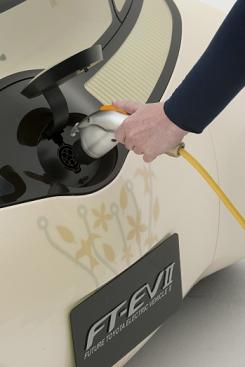Houston, TX's City Workers To Share Green Vehicles
 Already operating one of the nation's largest municipal fleets of hybrid vehicles, Houston, TX's City Hall on August 22 strengthened its commitment to "green" transportation by launching a computer-managed car-sharing program for three hundred workers in thirteen downtown departments.
Already operating one of the nation's largest municipal fleets of hybrid vehicles, Houston, TX's City Hall on August 22 strengthened its commitment to "green" transportation by launching a computer-managed car-sharing program for three hundred workers in thirteen downtown departments.
The so-called Houston Fleet Share, which will be expanded to the City's airport system and other sites outside downtown by year's end, marks the first time such a program has utilized battery-powered vehicles. Half the program's fifty-car fleet consists of Nissan Leaf EVs; hybrids and other "plug-ins" make up the remainder.
Houston already operates more than 800 hybrid vehicles, the third largest such municipal fleet in the nation. Hybrid vehicles account for half of the city's non-specialty, light-duty fleet.
Mayor Annise Parker said the fleet-share program, designed by Cambridge, MA-based Zipcar Inc., will allow the city to "right-size its fleet, reduce costs, balance utilization, and streamline fleet operations."
Mike Serafino, Zipcar's General Manager for University and Fast Fleets, said a similar program in Washington, D.C., reduced the district's fleet from two hundred ninety vehicles to eighty.
Among the first Houston city departments to use the computer-managed fleet are solid waste, legal, library, finance, information technology, and public works.
City Sustainability Director Laura Spanjian said Houston Fleet Share is funded by a $134,750 American Recovery and Reinvestment Act grant.
The program, which began the week of August 20, works much as do Zipcar's commercial operations: workers desiring to use a vehicle make on-line reservations, specifying times for pickup and return. All vehicles in the initial program will be parked within walking distance of downtown city offices.
Previously, Spanjian said, each department managed its own fleet. As a result, some vehicles sat unused, while workers in other departments were faced with a shortage. The City, Spanjian said, should save money by making maximum use of the fleet. The new system also should reduce the need for city employees to use their own cars for municipal business, she said.
"With a traditional motor pool," Serafino said, "if John needs a car at 10:00 and Jane needs a car at 12:00, I can guarantee you that you will have two cars going out. With cars connected in an online grid, John and Jane can use the same car."
 Already operating one of the nation's largest municipal fleets of hybrid vehicles, Houston, TX's City Hall on August 22 strengthened its commitment to "green" transportation by launching a computer-managed car-sharing program for three hundred workers in thirteen downtown departments.
Already operating one of the nation's largest municipal fleets of hybrid vehicles, Houston, TX's City Hall on August 22 strengthened its commitment to "green" transportation by launching a computer-managed car-sharing program for three hundred workers in thirteen downtown departments.